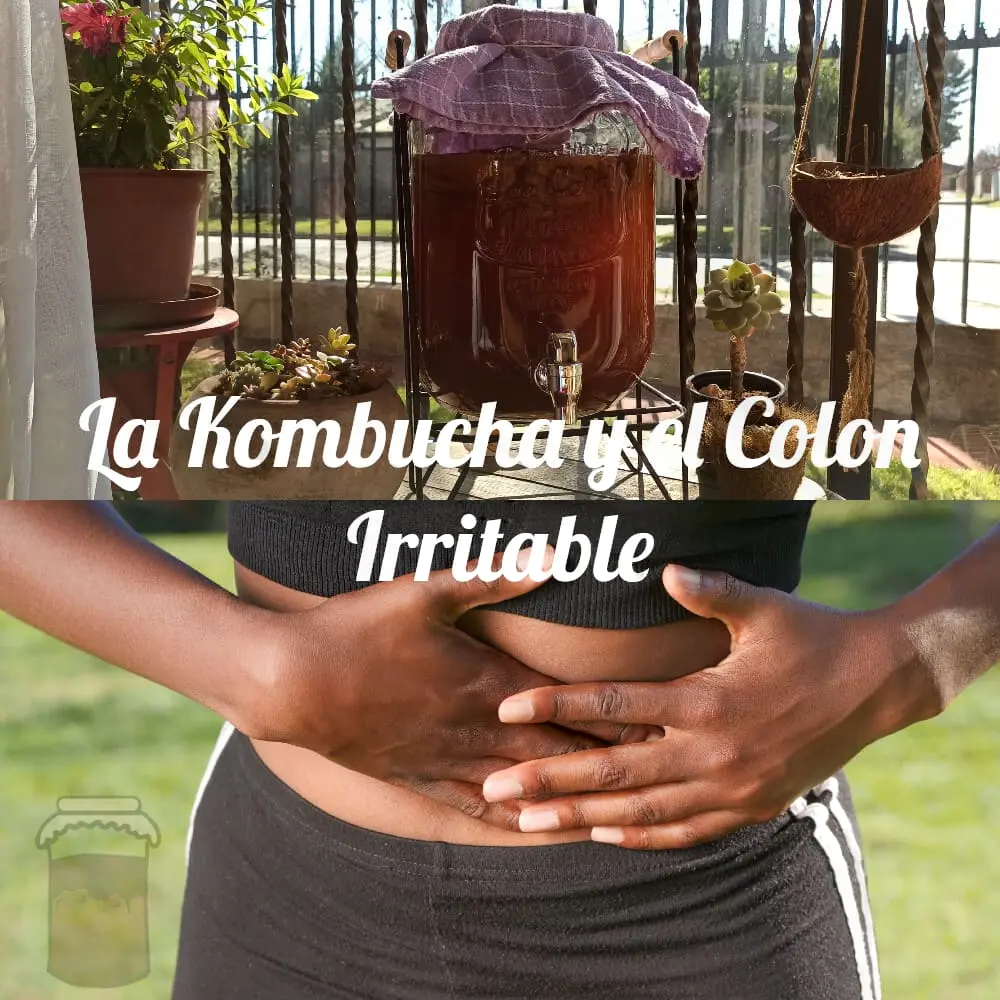Intestinal problems are usually of food, digestive or microbial imbalances, for this reason kombucha is often considered as a possible treatment since its components can work for its control. Spoiler: apparently not beneficial for all intestinal problems.
With regard to the consumption of kombucha in order to relieve irritable bowel problems, also called irritable bowel syndrome (IBS), they are uncertain, since there are currently contradictions regarding the benefits or problems that some of its components can bring to this disease.
So far only dietary treatments have been considered as efficient in their control, in the same way, it was also determined that the appearance of symptoms and the severity of these may be related to certain types of food consumed. Therefore, drinking kombucha is something that should be examined before if you are suffering from this disease.
Can kombucha help with irritable bowel?
Probiotics have several functions that promote intestinal health, can maintain microbial balance and the integrity of the affected intestinal barrier.
Although there are some detractors about the safety of probiotics in IBS, several analyses have found the usefulness of several of these microorganisms in the treatment of irritable bowel. [1] [2]
Irritable bowel is a chronic disease where the treatment for functional recovery is still deficient, in patients with the disease a microbiota has been found very different from that of healthy people, presenting changes in bacteria, fungi and viruses that are normally found in the intestines.
Recent studies have considered the therapeutic potential of probiotics, which have been shown to be able to inhibit the binding of pathogenic bacteria in intestinal cells, improve the function of the intestinal epithelial barrier, acidification of the colon inhibits visceral hypersensitivity, etc. [1]
It seems that lactic acid bacteria (LAB) may be beneficial in the prevention and treatment of altered intestinal barrier, and in mouse models Lactobacillus plantarum was highlighted in the treatment of patients with irritable bowel. [3]
Now the most important research on probiotics as an alternative treatment for IBS focuses on Bifidobacteria and Lactobacillus, with clinical trials supporting and demonstrating improvement in secondary IBS symptoms. [4]
The above makes me believe that kefir should be much more effective than kombucha in this regard, since milk kefir is more abundant in these bacterial strains and also promotes their growth, but many times dairy products feel bad to people and is a point of setback.
I tell you the same thing in the article about the relationship between milk kefir and irritable bowel.
Why the controversy over kombucha consumption in IBS patients?
We could think of kombucha as a treatment for its probiotic content, but these in excess can not be beneficial to health, in addition the drink has other components that could harm its usefulness as a treatment, even being able to worsen the symptoms of IBS.
Products such as carbonated beverages, alcohol, coffee, and those containing FODMAP carbohydrates can cause or aggravate IBS.
Kombucha, despite its probiotic content for intestinal health, is a carbonated drink that contains these elements so that its benefits can be overshadowed and cause the opposite effect to the desired, which is the relief of the disease.
These results may depend on the amount of those components consumed. [5]
Therefore, it should be necessary to check the type of product to be consumed and consult with a doctor about the possible risks that it can bring as therapy in patients with IBS.
Does kombucha contain FODMAP?
Yes, and this has raised doubts about the benefits of consuming kombucha in IBS. It has been considered that changes in diet may be beneficial and, although more studies are still lacking, decreasing the consumption of foods with a high FODMAP is promising as a treatment. [6]
FODMAP stands for fermentable oligosaccharides, disaccharides, monosaccharides and polyols. Thepresence of these carbohydrates, gluten and poorly absorbed sugars such as fructose and sorbitol play an important role in the development and severity of IBS symptoms. In addition to worsening the symptoms of pain, bloating, flatulence, bloating, etc.
Therefore, kombucha consumption may not be recommended as low FODMAP diets are required for improvement and reduction of disease symptoms to be possible. [5]
Probiotic supplementation could also have an important role in improving IBS. However, in case of using kombucha for this it is necessary to see the recommendations of the doctor and see if its consumption can help treat your case, avoiding possible damage.
Likewise, more studies are needed to confirm the efficiency of this carbohydrate restriction, although the evidence at this time indicates that a diet low in FODMAPs can be effective, but quite restrictive at the same time. [7]
Can the caffeine in kombucha make symptoms worse?
The role of caffeine in IBS symptoms is quite uncertain. Several studies have indicated coffee and tea among the foods associated with IBS patients’ symptoms. On the other hand, it has not been observed that coffee consumption habits are more common among IBS patients than among healthy controls. [4]
In this study it was observed that there was a relationship that people who consumed more than 106.5 mg of caffeine had 47% more IBS than in people with a low consumption of 69.4 mg of caffeine. [8]
As a reference, depending on the type that was used in its preparation, for every 100 ml of kombucha we have between 4 to 7 mg of caffeine, very little. So it is very little, but very unlikely that you can have IBS problems due to the caffeine in kombucha.
Even so, this amount usually varies in different homemade or commercial kombucha drinks, where frequent consumption and beyond the recommended amount per day can be a problem, so always remember to see our article on recommended doses of kombucha.
Does the alcohol in kombucha contribute to the development of the disease?
It has been determined in several studies that the development of irritable bowel symptoms is associated with the consumption of alcoholic beverages, these cause problems in motility, permeability and absorption of nutrients in the gastrointestinal tract. [5]
Although, other analyses have not shown the same results associating IBS with alcohol consumption, these have suggested that there may be a difference in the amount consumed and the onset of the disease. [5]
Even in women with IBS, gastrointestinal symptoms such as abdominal pain and diarrhea have been associated only with excessive alcohol consumption (more than 4 drinks per day) and not with moderate (2-3 drinks per day) or light consumption (1 drink per day).
Regarding the above, a drink is defined as 350ml of normal beer (5% alcohol), 150ml of wine (12% alcohol) or 45ml of 80° distilled liquor (40% alcohol).
Therefore, consumption should not exceed one drink per day for women or 2 drinks in the case of men suffering from IBS.
That said, we have to link it with kombucha. Traditional kombucha has a percentage less than 0.5%, where in context with a normal beer, you should drink 8 servings of kombucha to equal one of beer, and therefore, the alcohol in traditional kombucha should not be a problem regarding irritable bowel.
The alcohol content depends a lot on fermentation, as well as second fermentation techniques that achieve hard or alcoholic kombuchas, and this is explained much better in the post about the alcohol content of kombucha.
Is it possible that I can prevent IBS?
Emotional problems and gut microbial dysbiosis are closely linked to the development of IBS, and drinking kombucha can help improve mood thanks to the microorganisms offered that improve microbial balance.
We talked about this recently in the post about kombucha and anxiety, where we saw that it could indeed have a positive effect, but as always we lack evidence in humans.
Probiotics also produce substances that inhibit inflammatory reactions that damage tissues and generate functional problems in intestinal digestion.
Anxiety and stress can impair the microbial balance of the gastrointestinal tract and increase alcohol consumption which has been shown to intensify IBS symptoms. In turn, IBS can promote the development of anxiety and stress, so it was very common for IBS care to be linked to stress control.
Something that I think is important to rule out on the subject, is that studies were done with rodents where they were induced a permeability in the intestine, and finally it was suggested that kombucha could be a promising therapeutic candidate to reduce intestinal permeability. [9]
Control of diseases that promote IBS?
Kombucha has antibacterial properties, due to its probiotic content and acidity, which contribute to the control of several enteropathogens such as Campylobacter and Salmonella that cause acute gastroenteritis. [7]
Damage to the lining of the colon can be avoided with the use of some probiotics, these protect gut health by inhibiting the binding and growth of pathogenic bacteria in intestinal cells, as well as modulating the immune reaction and improving mucin secretion. In this way, the function of the intestinal barrier, which is associated with the development of the disease, is improved. [1] [3]
Also, the role of lipid peroxidation in the development of the disease was observed in other studies , with decreased antioxidant capacity. This could be a fundamental aspect in the treatment, although studies that corroborate this information are still lacking. [10]
This is all the information we can offer you about it, concluding that there is still controversy in the use of kombucha in patients with irritable bowel, but in healthy people who have a control in the consumption of kombucha it is expected that they can observe the benefits with a lower risk of intestinal pathologies.
If you liked the post, I leave you other quite interesting ones that may be closely related to what you are looking for.

